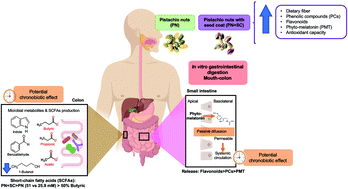In vitro gastrointestinal digestion and simulated colonic fermentation of pistachio nuts determine the bioaccessibility and biosynthesis of chronobiotics†
Abstract
Chronodisruption leads to obesity and other metabolic disorders that can be alleviated by food-derived potential chronobiotics, such as phytomelatonin (PMT), phenolic compounds (PCs) and dietary fiber rich pistachios. Pistachios with (PN + SC) or without (PN) the seed coat were investigated for their in vitro chronobiotic potential since they are one of the main reported PMT sources. Consequently we evaluated the bioaccessibility, permeability, and biosynthesis of pistachio chronobiotics, particularly PMT, during gastrointestinal and colonic fermentation. The maximum in vitro bioaccessibility and apparent permeability (efflux-prone) of PCs, flavonoids and PMT were sample-specific [∼1.3% (both), 27 and 3.4% (PN + SC)], but additional amounts (flavonoids > PCs > PMT) were released under simulated colonic conditions. Short-chain fatty acids (SCFAs; 38 mM; >50% butyrate, PN + SC > PN) and some metabolites (e.g., indole, benzaldehyde, phenolic acids, and aliphatic/aromatic hydrocarbons) were detected depending on the sample. The predominant pistachio butyrate production during in vitro colonic fermentation can improve chronodisruption and benefit obese individuals. Pistachio's digestion increases the bioaccessibility and intestinal permeability of potential chronobiotics (PMT and PCs) and the biosynthesis of colonic metabolites (SCFAs, among others) also with chronobiotic potential.



 Please wait while we load your content...
Please wait while we load your content...